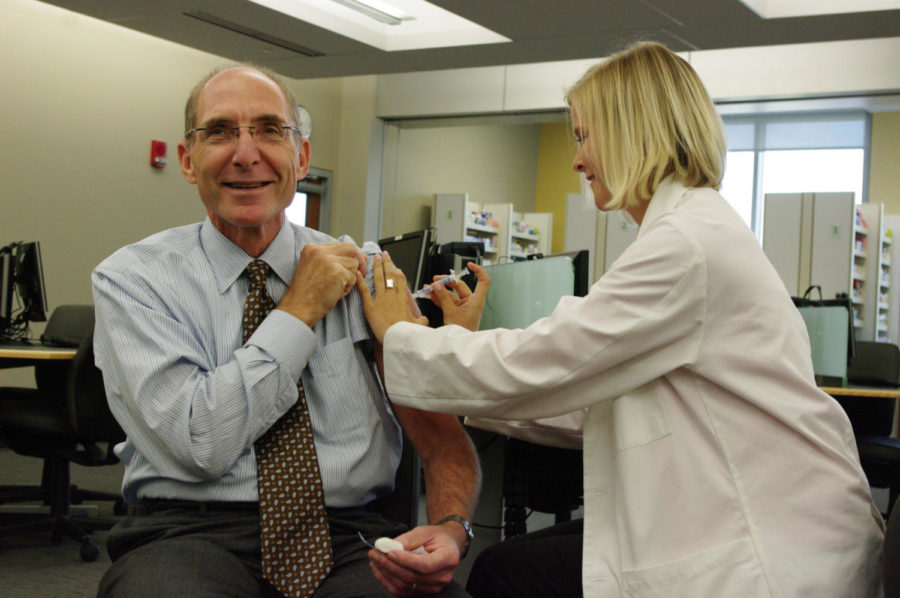It’s still flu season; here’s what you need to know
University of Kentucky President Dr. Eli Capilouto received his flu shots from UK pharmacy student Leanne Hewlett in the UK pharmacy building on Oct 6, 2011. Photo by Collin Lindstrom | Staff
February 21, 2018
One-hundred degree or more fevers, body aches, fatigue and headaches are just a few of the many symptoms that can come with this year’s flu, health officials say.
Ann Hays, MD, University Health Services Medical Director, said this year’s strain has a penchant for sudden fever, aches and cough. Symptoms may vary from person to person, and some may not experience a fever while 25 percent will experience nausea, vomiting and diarrhea.
“This season, the predominant strain is also the nastiest, H3N2, which causes the worst outbreaks of seasonal flu epidemics each year,” Hays said.
To prevent getting the flu, Hays recommends that students get a flu shot every year. Between 5 and 20 percent of the US will contract the flu virus each year, so it is important to cover your bases. It’s not too late, as flu shots are available for $10 at UHS with a valid student idea.
According to the Centers for Disease Control and Prevention, the three most important actions to fighting the flu include getting the vaccine, taking precautions to stop the spread of germs and taking flu antiviral drugs if a doctor prescribes them. Influenza is a virus, however, and University Health Service does not prescribe antibiotics.
Covering your nose and mouth when you sneeze or cough can help slow the spread of germs. Frequent hand washing is also crucial to keeping the community healthy, according to the CDC.
What should you do if you get the flu?
First, let professors know ahead of time that you’ll be missing class. A UHS visit and diagnosis will provide students with a Tier 3 excuse, which should be provided to professors as well.
Scheduling an appointment with UHS can be done by calling 323-APPT (2778) or using you’re myUK portal. Under myInfo, click on Student Health on the left Detailed Navigation menu. Click on the drop down menu under the medicat logo and select ‘Appointment.’ Choose your reason for clinic visit by selecting the box that says, “Student Clinic- Sore throat, cold, flu, cough, sinus, or allergy problem.” Then either select your provider, or leave the drop down menu on ‘All’ to see all available appointments. Simply select your date and time. Be sure to arrive 15 minutes early to your appointment on the second floor of the University Health Service Building to allow yourself time to check in.
Students should stay home for at least 24 hours after their fever has broken, that is without using any medication to induce it (acetaminophen, ibuprofen, etc.)
A visit to the hospital should be considered if symptoms become worse after 5-6 days when they should be better, according to Hays. If you experience difficulty breathing, chest pain, severe abdominal pain, confusion, dizziness, and non-stop vomiting, it’s time to visit the hospital.
Flu-related deaths are often due to secondary infections like pneumonia, according to Hays. People younger than two years old and older than 65 years old are more at risk for flu complication.
Residence Life is taking steps toward a healthy campus.
“One of our main focuses in regards to the flu is to make sure students have information about how to stay healthy and they know what resources to turn to if they feel sick,” Tony Ralph, Directory of Residence Life said.
At the front desk of each residence hall, there is a jug of hand sanitizer for public use. Residence life encourages the instructions of medical professionals, like washing hands often and using Clorox bleach to clean dorm rooms, according to Ralph.
Available to students who are making an effort to isolate themselves when they are sick is UK Dining food delivery. Food can be requested and delivered to the front desk of the residence halls. Residence Life encourages students to isolate themselves when sick, as not to infect anyone else in their residence hall.
“I think anywhere students are in close proximity (classrooms, dining areas, residence halls) there is more opportunity for them to catch things from each other,” Ralph said.
































































































































































